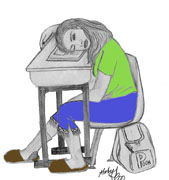Catching those Zzzzzs
Most teens have a hard time getting enough sleep, writes Alexandria, 16.
A typical day for me begins when my alarm clock rudely screams in my ear at 5:30 a.m. and doesn’t end until I hop off the school bus around 8 p.m. I then spend a good two to three hours doing homework and preparing for tests and quizzes in school. By the time I finish everything I have to do, I’m lucky if I get four or five hours of sleep at the most. At the beginning of the week, I can handle the lack of sleep, but as the days roll by, my sleep deficit grows.
By Wednesday morning, the drowsiness, grumpiness and sluggishness kicks in. Simply walking down the hallways or staying awake in class can seem like a chore. And it is an even more arduous task to sweat and grunt my way through cheerleading practices, or lift the lead in my eyelids while spending countless hours staring at the computer to produce my school newspaper.
Although most students’ schedules aren’t as rigorous as mine, one thing that a majority of us share is that infamous tired feeling. We all know that sleep is needed in order for the body to function properly, so why don’t we just sleep more?
"It’s not that simple," says Maria Gonzalez, a sophomore at South Gate High School. "There is just so much to do, especially senior year. In order to gain something, you must lose something, and unfortunately, sleep is what’s lost."
Nashaun Neal, a senior at Bravo Medical Magnet, could not agree more. "Bravo is such a competitive school," says Nashaun. "It’s so much easier to sacrifice sleep for academic achievement and sleep in on weekends and holidays."
As difficult as it is to maintain decent grades and get a substantial amount of sleep, things may be a bit tougher for athletes and participants of other extracurricular activities. They get home late, tired and hungry, but still strive for academic excellence.
"It’s really a challenge getting home tired and sore from practice knowing that you’ve got that test to study for or that project to finish. But staying up late isn’t the problem. It’s getting up the next morning and making it through the day where the struggle comes in," says cheerleader Megha Agarwal, of Bravo Medical Magnet. "But when you get the test back and it has an ‘A’ on it, or you get your report card and your GPA is a 4.0+, it’s all worthwhile."
Dina Szklarek, a senior at the Pilgrim School, agrees. "You can sleep in on the weekends and pupil-free days, but when you apply for college, it’s not like you can put ‘too tired to work’ in place of impressive grades and still get in."
Although most teens may sleep in on the weekends to make up for the hours lost during the school week, sleep researcher Dr. Mary Caskadon of Brown University thinks that’s not enough. "For years we have been going under the assumption that as children grow into adulthood, they need less sleep, when that is not the case. A teenager’s irregular sleep schedule (up late during the weeknights and sleeping in on weekends) contributes to the lack of restful sleep."
In her research, Caskadon found that as teens enter puberty, they experience a hormonal shift that affects their sleep patterns. Teens need more sleep—at least nine hours.




